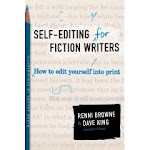Breaking the Rules
Sometimes, you need to ignore even the best advice.
Reprinted from Write On! the newsletter of Capital City Young Writers, December 2009.
"There are three rules for writing a novel. Unfortunately, no one knows what they are."
W. Somerset Maughm
If you’re reading this, then you’ve probably already read a lot about the art and craft of writing – how-to books, articles in both magazines and online, writing blogs. Maybe you’ve joined critique groups to trade feedback with other writers or taken writing classes. Maybe you’ve even read Self-Editing for Fiction Writers.
These various sources of information can often be a lot of help. They can open your eyes to writing techniques you didn’t know about, or help you see problems in your writing that you might not have otherwise noticed. But there’s a danger to all of them – not in the sources themselves, but in the way you approach them. Taken the wrong way, even the best of them can damage your writing. You can avoid this danger, though, if you remember one simple truth.
Sometimes, you need to ignore even the best advice.
A client struggling with his dialogue once asked me how long his sentences should be. He'd heard a writing teacher say that ten words was the limit. I replied that shorter sentences often increase the pace and tension of a story, which is usually a good thing – that’s probably why the teacher gave the advice she did. But it was far more critical for him to listen to his characters. If they were deliberate or rambling, they should speak in longer sentences. The terse or dimwitted should use shorter ones. He was in trouble because he was putting the advice he’d gotten ahead of the people he was trying to create.
The techniques you use in writing your story can’t be separated from the story itself. For instance, if you use more interior monologue to convey a character's reactions to events, your character will seem more introspective. Nor can you write shorter scenes without changing how your plot tension builds. A rule about the right way to structure a plot won’t help when what you need is the right to structure your plot. The best way to convey characters is always whatever is the best way to convey your characters. You need to find the advice that will let you tell your story rather than adapting your story to the advice you’re getting.
Of course, you do need to get advice. Your story may not be working because you're using a particular writing technique in a clumsy way through inexperience or inattention. You may be using an approach that doesn’t fit your story or ignoring another that does. But you can’t treat what you learn as immutable law: "Thou shalt not use dream sequences," "Thou shalt have no narrative summary," "Thou shalt not commit omniscient narration for it is an abomination." Instead, think of writing techniques as tools that let you perform certain tasks as you write.
The key to using any tool intelligently is to understand how it works. So as you’re reading about how often to paragraph, try to see how your writing changes if you paragraph more or less frequently. As you learn ways to work a character’s past into the story, ask yourself how the different techniques would affect the way your readers feel about that character. Then, once you have a feel for what the different tools can and cannot do, focus on your story, on your characters, on the particular vision that is your novel. This will help you choose the tools that will best create your story.
Above all, never follow advice blindly – not even my own. Some of my clients have become clients because they took the advice in Self-Editing for Fiction Writers as if it were commandments from on high – automatically eliminating all –ly adverbs or never writing anything that wasn’t an immediate scene. Sometimes the right thing to do is to ignore advice, even the best advice.
Good writing,













Dave says:
ReplyDeleteInspiration. When some piece of advice inspires you, makes you say, “Of course, that’s what I’m doing wrong!” or leaves you itching to start on your rewrite, then you've just learned something you really need.
THAT MIGHT JUST BE THE BEST ADVICE I'VE HEARD!
I like the inspiration test. That inspires me! LOL Great article on a tricky subject. This is a keeper.
ReplyDeleteThat's wonderful advice from Dave King. I've tried to use that in my writing: once I learned the rules, I started to break them. Most famous authors don't follow any rules.
ReplyDeleteDiane
Blindly following anything or anyone is always dangerous...in writing, too. That's very good to know! =]
ReplyDeleteThanks!
This is excellent food for thought and sound advice from Dave King. Thanks!
ReplyDeleteIt takes a man comfortable in his own skin to write a book on the craft and then tell us to ignore his advice if inspiration strikes. But thanks, this does free up the artist in all of us.
ReplyDeleteLoved the advice, Dave, both what's in your book and the bit about ignoring what's in the book. LOL
ReplyDeleteSeriously, I know I've done something amazing and when I've done something mediocre. It's raising the mediocre to acceptable standards or just re-writing that's hard. There's a Jars of Clay song that's in my head: "I've no fear of drowning, it's the breathing that's taking all this work." Yeah, or the rewriting. :)
Good advice. I like the inspiration part, too.
ReplyDeleteExcellent article. As an editor, I have to make sure my clients understand that my changes are suggestions only. Some clients change every item I mark, others fight against changing anything - with both extremes it's usually a newer writer. Those more advanced have learned what works, what doesn't, when an editor's right, when we're wrong (gasp!) or just don't get it.
ReplyDeleteLoved the article! I've tried twice in my last two books to use a couple of sentences in omniscient POV as dramatic effect. Both times the line editor/outside editor agreed with me, but the publishing house editor wouldn't let it pass. I agree with Mr. King that no established rules are immutable. Surely artistic license comes into play here somehow.
ReplyDeleteOh, the rules, the rules . . . don't get me started. I've read that every adverb, not just the "ly" ones, should be deleted. And recently I read that an author should never, ever write a prologue. Why? A prologue can set the whole tone of a book. It can grip you, it can be beautiful and touching. (Earlene Fowler's prologue in her Mariner's Compass comes to mind.) Sometimes it's the very breaking of the so-called rules that makes a book.
ReplyDeleteThat was excellent advice! I'll be careful not to follow it to closely. LOL! Really, it was refreshing and very practical.
ReplyDeleteWow. Thanks for all the kind comments. I had no idea the article was _that_ good.
ReplyDelete